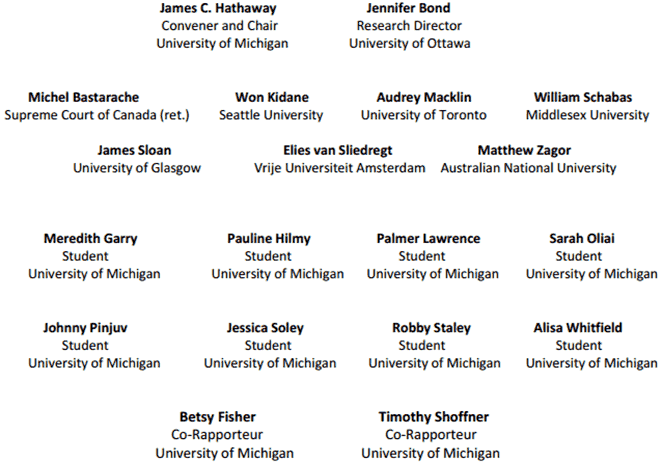The Michigan Guidelines on the Exclusion of International Criminals
THE MICHIGAN GUIDELINES ON THE EXCLUSION OF INTERNATIONAL CRIMINALS
Article 1(F)(a) of the Convention relating to the Status of Refugees (“Convention”) requires the exclusion from refugee status of “… any person with respect to whom there are serious reasons for considering that… he has committed a crime against peace, a war crime, or a crime against humanity, as defined in the international instruments drawn up to make provision in respect of such crimes.” Current state practice relating to Article 1(F)(a) exclusion fails to draw consistently on international criminal law, as is mandated by the Convention’s text. The process of drawing on international criminal law is in any event complex given both the continuing evolution of international criminal law and normative divergence among the interpretations adopted by courts and national authorities. Most important, there has been a failure to recognize that international criminal law must be drawn upon in a way that takes full account of key differences between the purpose and structure of international criminal law and those of international refugee law. In the result, Article 1(F)(a) is prone to misapplication, leading to unwarranted denials of protection. With a view to promoting a shared understanding of the proper approach to Article 1(F)(a) exclusion from refugee status, we have engaged in sustained collaborative study and reflection on relevant norms and state practice. Our research was debated and refined at the Sixth Colloquium on Challenges in International Refugee Law, convened in March 2013 by the University of Michigan’s Program in Refugee and Asylum Law. These Guidelines are the product of that endeavor, and reflect the consensus of Colloquium participants on how decision makers can best ensure the application of Article 1(F)(a) in a manner that conforms to international legal principles.
General Considerations
1. A person who falls afoul of Article 1(F)(a) of the Convention must not be recognized as a refugee, even assuming that he or she faces a well-founded fear of being persecuted. Because of the seriousness of a decision to deny protection to a person shown or assumed to face the risk of persecution, Article 1(F)(a), like all exclusion clauses, should be applied with caution. 2. Decision makers moreover have a duty in good faith to interpret the text of Article 1(F)(a) not by reference to text alone, but rather in a manner consistent with the context, object, and purpose of that article and of the Convention as a whole. 3. The context of Article 1(F)(a) includes, in particular, the fact that decisions on refugee exclusion are binary: an individual either is, or is not, excluded from refugee status. In contrast, the ramifications of a finding of guilt in the context of international criminal law can be tempered by the sentencing process – an option not available to the refugee decision maker. This contextual difference should be recognized and, to the greatest extent possible, accommodated in the assessment of criminal responsibility for purposes of exclusion from refugee status. 4. The fundamental object and purpose of Article 1(F)(a) is to exclude persons whose international criminal conduct means that their admission as a refugee threatens the integrity of the international refugee regime. This goal is to be distinguished from the advancement of host state safety and security, a matter addressed by Article 33(2) of the Convention. Nor is Article 1(F)(a) exclusion required to ensure the punishment of international criminals. Like all other persons, refugees suspected of having committed an international crime are subject to the duty of states to either prosecute or extradite (“aut dedere aut judicare”), this being the appropriate means of ensuring accountability for unexpiated international criminality.
A Crime as Defined in the International Instruments
5. Article 1(F)(a) requires that exclusion be grounded in international criminal law instruments that define crimes against peace, war crimes, and crimes against humanity. The express reference to “international instruments” mandates reliance on codified standards of international, not domestic, law. This open-ended framing moreover requires that account be taken of international criminal law instruments that have come into force in the years since the Convention’s drafting. 6. Given the plurality of international criminal law instruments, a decision maker contemplating exclusion under Article 1(F)(a) should first identify those instruments that are most substantively relevant to the criminal conduct alleged. As leading courts interpreting Art. 1(F)(a) have recognized, the Rome Statute of the International Criminal Court is particularly relevant in light of its recent vintage, detailed definitions of relevant crimes, and global scope of application. 7. In addition to analysis of the text of relevant international criminal law instruments, account should be taken of persuasive interpretations of such instruments rendered by both international tribunals and national courts. Interpretations that offer an authoritative and cogent understanding of how international criminal norms apply in comparable factual circumstances are of particular value. Has Committed a Crime 8. The phrase “he has committed a crime” makes clear the importance of finding individual criminal responsibility in relation to an enumerated crime before refusing to recognize refugee status in a particular case. The decision maker must first identify the pertinent mode of liability, and then carefully assess the applicable actus reus, mens rea, and defences. 9. The modes of liability that will be most apposite to Article 1(F)(a) exclusion are those that clearly specify a particular person’s direct role in the crime: committing the crime; ordering, soliciting, or inducing the crime; and aiding, abetting, or otherwise assisting in the commission of the crime. Modes of liability predicated on more attenuated forms of involvement require a decision maker to undertake especially careful analysis before concluding that the individual concerned “has committed” an enumerated crime. 10. In keeping with general principles of criminal law, an individual can only have “committed a crime” if the relevant conduct was criminal at the time of its commission. The definition of a crime should moreover be strictly construed, with ambiguity resolved in favor of the person being considered for exclusion from refugee status and consideration given to whether an action that is truly de minimis evinces the moral responsibility required for commission of an international crime. 11. Exclusion under Article 1(F)(a) should not be ordered where the facts suggest a plausible defence, since a person entitled to the benefit of a relevant defence has not “committed a crime.” In keeping with the approach codified in Article 31 of the Rome Statute, a broad range of substantively relevant defences should be considered. To accommodate the important contextual difference between international criminal law and international refugee law noted in para. 3 above, relevant defences should be understood to include not simply pure defences, but also factors that can variably be invoked as either a defence or a mitigating factor. Serious Reasons for Considering 12. The text of Article 1(F)(a) directs decision makers to exclude an individual from refugee status only where there are “serious reasons for considering” that he or she has committed a crime against peace, a war crime, or a crime against humanity. “Serious reasons” sets the standard in both fact and law that must be met in an exclusion decision, and thus has both an evidentiary and a substantive role. 13. As an evidentiary matter, the “serious reasons” standard is generally understood to be a means of accommodating the practical constraints of access to less evidence than is normally available in a criminal trial. The decision maker must nonetheless be satisfied that there is clear and convincing evidence that a crime has been committed by the individual before finding the person to be excluded under Article 1(F)(a). 14. As a substantive matter, the “serious reasons” standard requires that exclusion decisions be based upon settled norms of international criminal law. Where an individual’s conduct meets the standard for liability under such a settled norm, he or she should be excluded from refugee status. 15. There may, however, be a material conflict among authoritative understandings of relevant international criminal law instruments. Because there are not “serious reasons” for considering an individual to have “committed a crime” where the relevant criteria for imposition of criminal liability are contested, the “serious reasons for considering” standard should be understood to require the decision maker to give effect to the relevant norm that most restricts criminal responsibility. Thus, where the standards for the imposition of liability (modes of liability, actus reus, and mens rea) are contested, the most constrained authoritative interpretation of relevant instruments should be relied upon. Similarly, where the standards for invocation of a relevant defence are contested, the most generous authoritative reading of plausible defences should be adopted. These Guidelines reflect the consensus of all the participants at the Sixth Colloquium on Challenges in Refugee Law, held at Ann Arbor, Michigan, USA, on March 22 – 24, 2013.  The Colloquium deliberations benefited from the counsel of Sibylle Kapferer, Senior Legal Officer, Division of International Protection, United Nations High Commissioner for Refugees.
The Colloquium deliberations benefited from the counsel of Sibylle Kapferer, Senior Legal Officer, Division of International Protection, United Nations High Commissioner for Refugees.


